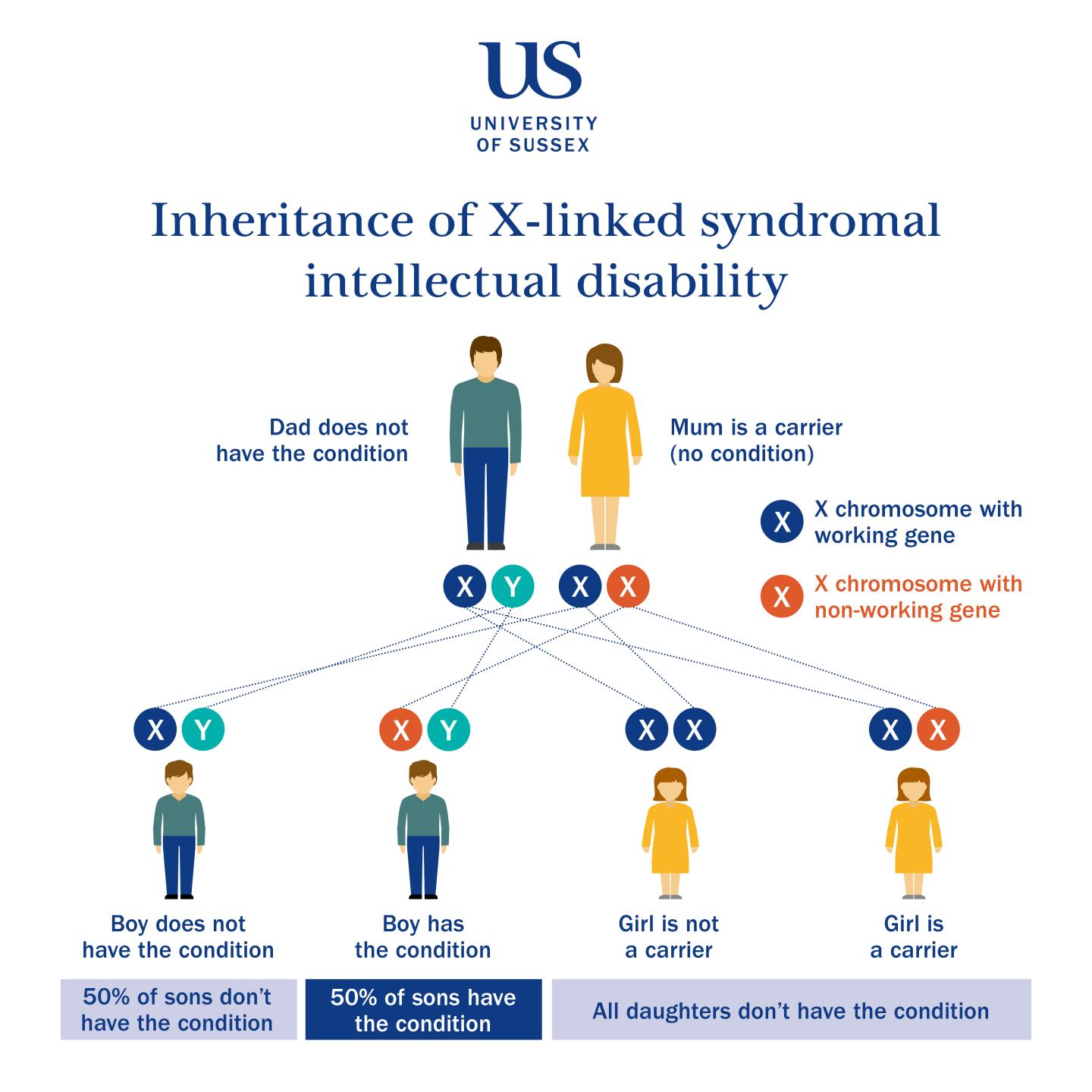Discovery will help end ‘diagnostic odyssey’ for many families

Credit: University of Sussex
Researchers at the University of Sussex have discovered a new genetic defect which causes a form of intellectual disability; a finding that will improve screening programmes and help to end a ‘diagnostic odyssey’ for families across the globe.
‘X-linked syndromal intellectual disability’ (XLID) affects around 3% of the global population with the underlying genetic mutations being carried and passed on by unaffected females via their X-chromosome (human females possess two copies of the X chromosome, while males only have one).
These ‘carrier’ mothers have a 50% chance of passing on the mutated genes to their offspring but interestingly, for this form of XLID, symptoms are only observed in males. These can include behavioural issues, stunted growth, and smaller than average brains and testes.
Up until now, researchers had identified 141 genes thought to cause XLID but there are still many cases of unknown genetic cause.
In a paper published in the prestigious American Journal of Human Genetics, Professor Mark O’Driscoll from the Genome Damage and Stability Centre at the University of Sussex and Professor Hilde Van Esch from the Center for Human Genetics, University Hospitals Leuven and Katholieke Universiteit Leuven in Belgium have identified a new gene defect, which will help clinicians around the world accurately diagnose further cases of XLID.
Professor of Human Molecular Genetics, Mark O’Driscoll said: “We worked with teams from England, Scotland, Belgium, Estonia, America and Australia to obtain blood cells from five unrelated families that had a strikingly similar form of syndromal XLID of unknown cause.
“By using a variety of sophisticated and state-of-the art DNA sequencing technologies, together we’ve been able to identify multiple distinct mutations in a single gene that causes the syndrome in each of these families.
“This is a completely new gene target which can now be incorporated into existing screening programmes worldwide to aid future diagnoses and accurate genetic counselling along with patient management.”
The gene identified makes a fundamental component of the machinery our cells use to replicate their DNA during cell division, called “DNA Polymerase a-primase [alpha-primase]”.
This was an unexpected finding as it was assumed that any impairment to this function would be incompatible with life.
Therefore, the researchers faced the challenge of proving that the mutations found in the affected individuals did impair DNA Polymerase a-primase function [alpha-primase] but without destroying it completely.
This was facilitated by analysing cells from the patients’ blood using a recently developed complex technique called “DNA Fibre Combing”.
Here, individual DNA strands are painstakingly isolated on specially formulated microscope slides, following staining with chemical markers, enabling the researchers to monitor different aspects of the DNA replication process at a minute level.
While they were surprised to find that the rate of cell division was unaffected, the highly sensitive analysis conducted by the Sussex team showed that several replication parameters of the DNA molecules from these cells were highly problematic.
Professor O’Driscoll said: “My colleague and initiator of this project Hilde Van Esch, has treated affected members of one of these families for over 20 years without knowing their precise genomic defect, which illustrates the scale of the ‘diagnostic odyssey’ families with these conditions often face.
“Our work not only provides this family with clarity, but it also means that other researchers and clinicians around the world can review their cases of genetically undiagnosed XLID and check for the existence of this specific gene defect.”
Worldwide, there is an ongoing and significant effort to determine the underlying causes of all forms of genetic disease. In the United Kingdom this effort is spearheaded by NHS and Genomics England through the “100,000 Genomes project”.
Thanks to this new discovery, screening programmes for XLID can now be expanded to include this newly discovered mutation helping solve undiagnosed cases.
###
Media Contact
Stephanie Allen
[email protected]
Original Source
https:/




